Vietnam has denied using exchange rates and monetary policy to facilitate export after the country was put on a U.S. watch list of currency manipulators.
“The State Bank of Vietnam has never used exchange rates to compete with trade partners and never purposely intervened in monetary policy to help with exports,” the central bank said in a statement on Tuesday.
“Vietnam does not manipulate currency.”
The statement followed the U.S. Department of the Treasury adding Vietnam to a list of ten countries to be monitored for alleged currency manipulation in a report on the macroeconomic and foreign exchange policies of Washington’s major trade partners.
“Treasury found that ten major trading partners warrant placement on Treasury’s ‘Monitoring List’ of major trading partners that merit close attention to their currency practices: China, Germany, Ireland, Italy, Japan, Korea, Malaysia, Singapore, Switzerland, and Vietnam,” the department said in a press release on its website.
The U.S. designates a country as a currency manipulator when that country resorts to unfair currency practices such as currency intervention or monetary policy that influences the exchange rate and commercial policy, so as to enjoy a trade advantage.
In a report in May 2019, Vietnam for the first time became one of nine countries to be monitored for meeting two standards on a trade surplus with the U.S. and a highly positive current account balance.
The report also said that a listed country would be monitored in the next two reviews.
So in the latest report in January, Vietnam continued to be on the watch list of currency manipulators even though it has satisfied only one condition, a trade surplus.
Vietnam’s trade surplus with the U.S. rose to almost US$47 billion in 2019 from $34.87 billion in 2018.
The Southeast Asian country’s current account balance accounted for 1.7 percent of its GDP while its net foreign exchange purchases were equal to 0.8 percent of the gross domestic product.
Vietnam’s GDP reached $262 billion last year.
“The U.S. Treasury will continue to look at data on Vietnam’s trade, current account balance, and macroeconomic and monetary policy,” the State Bank of Vietnam said.
“They’ll possibly discuss issues with relevant Vietnamese agencies when necessary.”
The State Bank of Vietnam will work with related bodies on the issues raised by the U.S. Treasury in a cooperative manner, it added.
The bank is to implement its monetary policy to contain inflation, stabilize the macroeconomy, sustain reasonable economic growth, and flexibly regulate exchange rates, all meant to respond to market developments but not to create an unfair competitive edge in international trade.
Like us on Facebook or follow us on Twitter to get the latest news about Vietnam!
















































